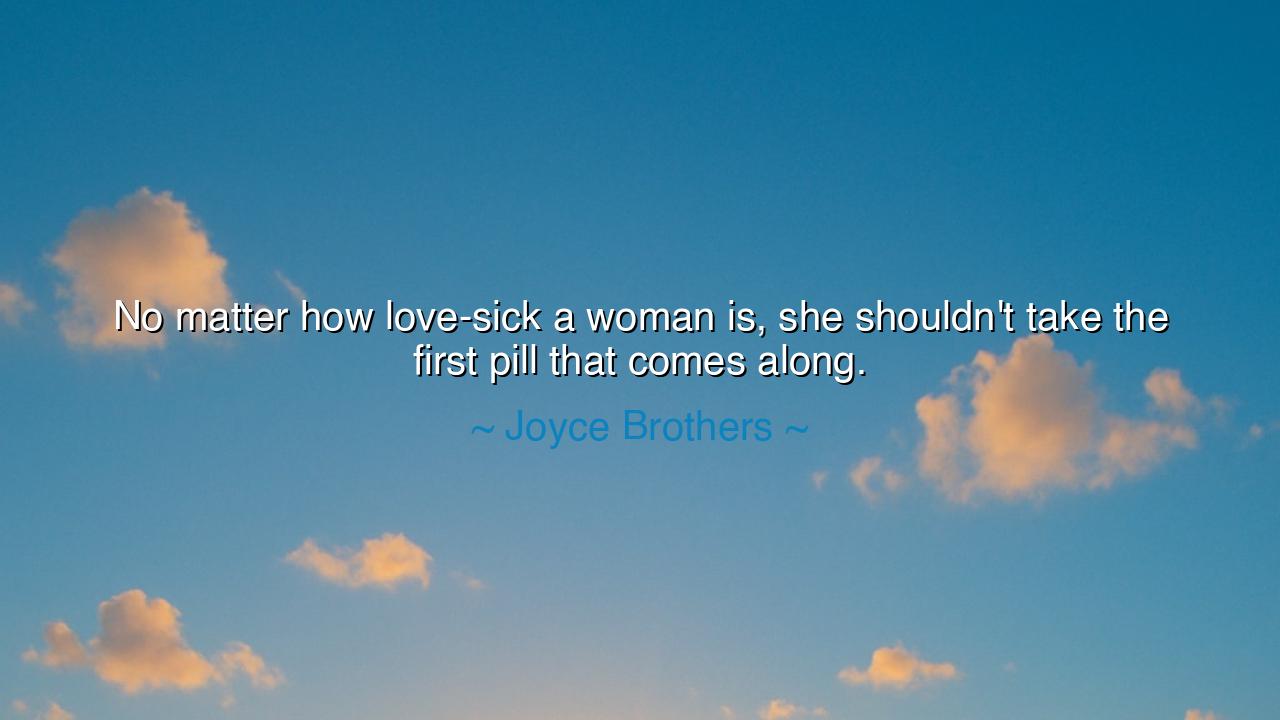
No matter how love-sick a woman is, she shouldn't take the first
No matter how love-sick a woman is, she shouldn't take the first pill that comes along.






When Joyce Brothers said, “No matter how love-sick a woman is, she shouldn’t take the first pill that comes along,” she spoke not of medicine, but of temptation, discernment, and the eternal struggle of the heart to choose wisely in moments of weakness. Beneath her witty metaphor lies a timeless truth: that love, in its most desperate form, can cloud the mind, and that those who hunger most for affection are often those most in need of patience. Her words, though gentle in tone, carry the gravity of wisdom — the reminder that healing must come from within, not from the quick fixes the world so readily offers.
To be love-sick is to be both blessed and burdened — to feel so deeply that the absence of love becomes a kind of pain. It is a state known to poets, saints, and dreamers across the centuries. Yet Brothers warns that in this fever of longing, one must beware of easy remedies. The “first pill that comes along” is the symbol of impulsive comfort — the relationship entered out of loneliness, the affection accepted for fear of emptiness, the illusion of connection mistaken for true intimacy. Her counsel, like that of the ancient philosophers, is to guard one’s heart as one guards a sacred fire: never letting desperation feed it, lest it burn uncontrolled.
In every age, the wise have taught the same lesson in different tongues. The philosopher Seneca once said, “It is not that we love too little, but that we love without wisdom.” Like Brothers, he saw that the heart, when untethered from reason, becomes vulnerable to illusion. A woman (or man) who rushes toward the first promise of healing does not find love, but dependency — the quiet erosion of self in pursuit of comfort. True love, Brothers reminds us, does not come as a pill to numb pain, but as a patient restoration of balance — the union of soul and self-respect.
History, too, has borne witness to this truth. Consider Cleopatra, whose heart, vast and brilliant, led her to great loves and greater perils. She sought in Julius Caesar, and later Mark Antony, not only alliance but solace — the desire to fill the void that power and beauty could not soothe. Yet her tragedy was not in loving, but in believing that love alone could heal what was broken within. So too does Brothers caution the modern soul: do not mistake attachment for cure. The one who takes the “first pill” of affection without reflection risks losing not only peace but identity.
In her wisdom, Joyce Brothers speaks also to the dignity of waiting — that ancient and difficult art. To wait is not weakness; it is mastery of the self. It is to say, “I will not accept what lessens me, even if it momentarily relieves my pain.” In a world that rushes toward instant satisfaction — of desire, of loneliness, of grief — her words strike like a bell of truth. Love is not medicine for emptiness; it is the reward of one who has learned to stand whole. The one who can endure solitude without despair becomes, in time, the one most capable of love.
Her quote also reminds us that wisdom and humor often share the same root. Beneath her jest lies compassion — for she knows how easily the heart deceives itself when aching for tenderness. The “first pill” may take many forms: a hasty romance, a shallow companionship, or the belief that one must settle in order to be safe. But Brothers, like a gentle physician of the soul, prescribes something else entirely — self-knowledge. The cure for love-sickness is not in rushing toward another, but in understanding oneself enough to choose rightly when love truly arrives.
Therefore, O seeker of love and truth, take this counsel as your own: do not take the first pill that comes along. When the heart aches, breathe, and let time be your healer. Seek not to silence your longing, but to understand it. Ask yourself — what is it I truly desire? Is it companionship, or validation? Is it love, or escape from loneliness? For once you know the answer, the false medicines will lose their power.
And when true love does appear — as it will, in its season — you will recognize it not by the relief it brings, but by the peace it leaves behind. It will not dull your pain like a pill, but awaken your soul like light after long night. So hold fast to patience, nurture your strength, and remember the wisdom of Joyce Brothers: that the greatest love is not found through haste or hunger, but through the steady heart that has learned to wait for what is real.






AAdministratorAdministrator
Welcome, honored guests. Please leave a comment, we will respond soon